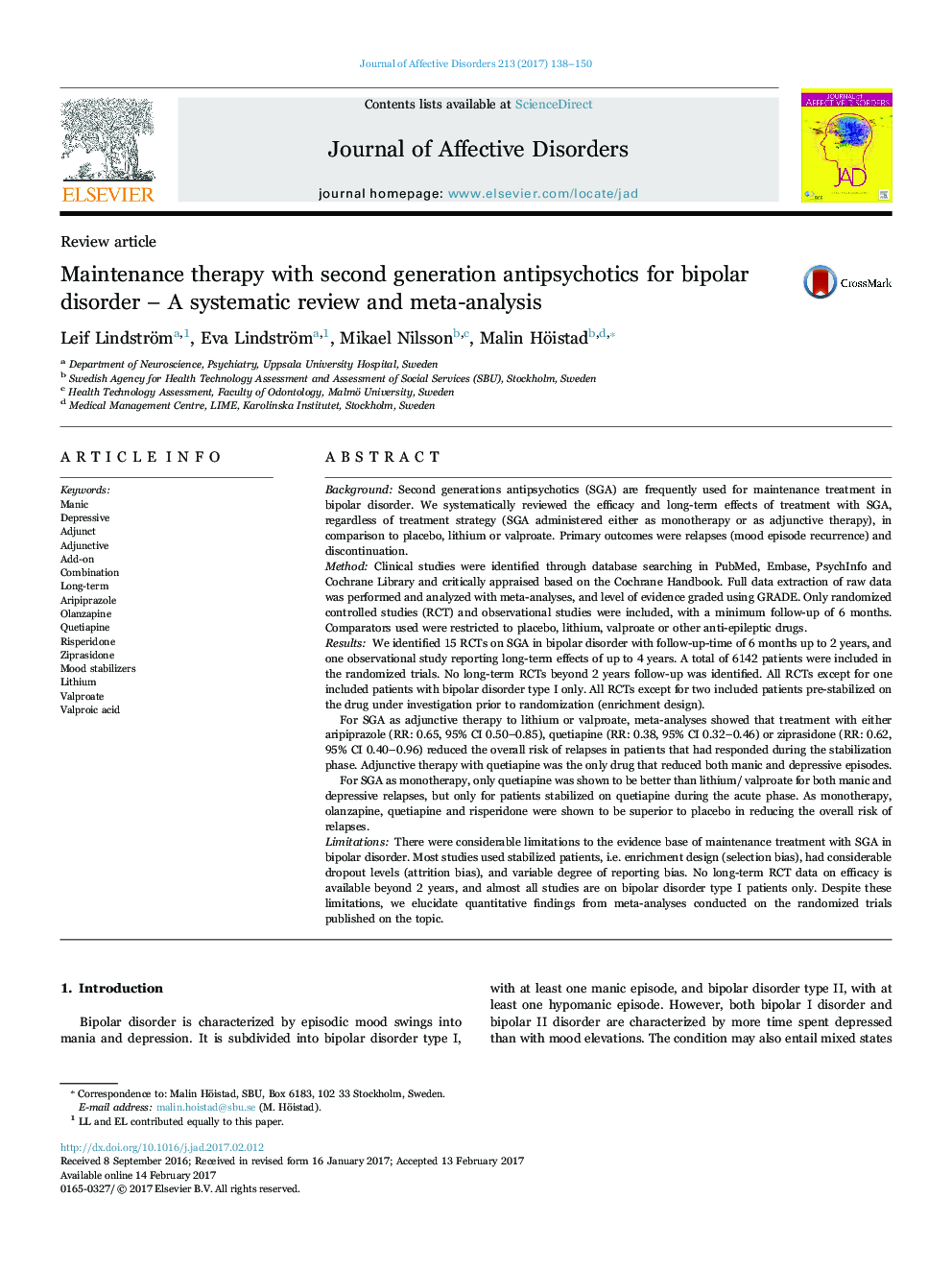| Article ID | Journal | Published Year | Pages | File Type |
|---|---|---|---|---|
| 5722238 | Journal of Affective Disorders | 2017 | 13 Pages |
â¢Considerable limitations to the evidence base of SGA for maintenance treatment.â¢No long-term randomized studies beyond 2 years follow-up have been published.â¢Almost all studies included patients with bipolar I disorder only, with patients already stabilized during an acute phase.â¢As adjunctive treament, aripirazole, quetiapine and ziprasidone reduced the overall risk of relapses.â¢Only quetiapine as adjunctive therapy reduced both manic as well as depressive relapses.
BackgroundSecond generations antipsychotics (SGA) are frequently used for maintenance treatment in bipolar disorder. We systematically reviewed the efficacy and long-term effects of treatment with SGA, regardless of treatment strategy (SGA administered either as monotherapy or as adjunctive therapy), in comparison to placebo, lithium or valproate. Primary outcomes were relapses (mood episode recurrence) and discontinuation.MethodClinical studies were identified through database searching in PubMed, Embase, PsychInfo and Cochrane Library and critically appraised based on the Cochrane Handbook. Full data extraction of raw data was performed and analyzed with meta-analyses, and level of evidence graded using GRADE. Only randomized controlled studies (RCT) and observational studies were included, with a minimum follow-up of 6 months. Comparators used were restricted to placebo, lithium, valproate or other anti-epileptic drugs.ResultsWe identified 15 RCTs on SGA in bipolar disorder with follow-up-time of 6 months up to 2 years, and one observational study reporting long-term effects of up to 4 years. A total of 6142 patients were included in the randomized trials. No long-term RCTs beyond 2 years follow-up was identified. All RCTs except for one included patients with bipolar disorder type I only. All RCTs except for two included patients pre-stabilized on the drug under investigation prior to randomization (enrichment design).For SGA as adjunctive therapy to lithium or valproate, meta-analyses showed that treatment with either aripiprazole (RR: 0.65, 95% CI 0.50-0.85), quetiapine (RR: 0.38, 95% CI 0.32-0.46) or ziprasidone (RR: 0.62, 95% CI 0.40-0.96) reduced the overall risk of relapses in patients that had responded during the stabilization phase. Adjunctive therapy with quetiapine was the only drug that reduced both manic and depressive episodes.For SGA as monotherapy, only quetiapine was shown to be better than lithium/ valproate for both manic and depressive relapses, but only for patients stabilized on quetiapine during the acute phase. As monotherapy, olanzapine, quetiapine and risperidone were shown to be superior to placebo in reducing the overall risk of relapses.LimitationsThere were considerable limitations to the evidence base of maintenance treatment with SGA in bipolar disorder. Most studies used stabilized patients, i.e. enrichment design (selection bias), had considerable dropout levels (attrition bias), and variable degree of reporting bias. No long-term RCT data on efficacy is available beyond 2 years, and almost all studies are on bipolar disorder type I patients only. Despite these limitations, we elucidate quantitative findings from meta-analyses conducted on the randomized trials published on the topic.
